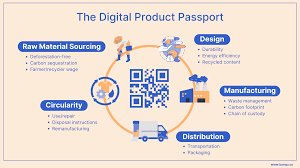Secure Item-Level Data – Ensuring Digital Product Passports Don’t Become Fake IDs


In today’s interconnected global economy, supply chain management plays a critical role in ensuring the efficiency and reliability of product distribution. With the rise of digital transformation, the concept of Digital Product Passports (DPP) has gained traction as a means to provide comprehensive, real-time visibility into the journey of products through the supply chain. However, the effectiveness of DPP relies heavily on the integrity of the data it encapsulates. Businesses should understand the significance of secure and accurate item-level supply chain data within DPP, emphasizing the paramount importance of data integrity.
What is a Digital Product Passport or Digital ID?
In a general sense, a digital product passport could be a form of digital documentation or record that accompanies a product from its creation through its use and disposal.
This digital passport might contain various types of information, such as:
- Product Information: Details about the product, including its specifications, manufacturing date, materials used, and other relevant information.
- Ownership and Usage History: Information about the product’s ownership and usage, which could be useful for warranty purposes or for understanding how the product has been utilized over time.
- Maintenance and Repair Records: Records of any maintenance or repairs performed on the product, which can be valuable for both consumers and service providers.
- Environmental Impact: Information about the environmental impact of the product, including details about its recyclability and disposal recommendations.
- Authentication and Anti-Counterfeiting Measures: Digital product passports could also include features to verify the authenticity of a product and help combat counterfeiting.
Supply Chain Data and the Digital Product Passport

Digital Product Passports (DPP) represent a paradigm shift in supply chain management, offering a holistic view of product life cycles, from manufacturing to consumption. At the core of DPP lies the aggregation of item-level data, encompassing crucial information such as origin, production processes, transportation, and handling conditions. This granular level of detail enables stakeholders to make informed decisions, enhance transparency, and mitigate risks across the supply chain.
The Benefits of a Digital Passport
Implementing digital product passports can have several benefits, such as improved transparency, better traceability, and enhanced consumer confidence. This concept is particularly relevant in industries where tracking a product’s journey is crucial, such as electronics, automotive, and other manufacturing sectors.
- Interoperability and Compatibility: Establishing global standards ensures that digital products can seamlessly interact with each other, promoting interoperability and compatibility across different platforms, devices, and systems.
- Security and Trust: Standardized digital product passports can include information about the product’s origin, authenticity, and compliance with security standards. This helps build trust among consumers and businesses, reducing the risk of counterfeit or compromised products entering the market.
- Supply Chain Transparency: Digital passports can be used to track and trace products throughout the supply chain. This transparency is crucial for verifying the authenticity of products, ensuring ethical sourcing, and addressing issues such as counterfeit goods and intellectual property theft.
- Regulatory Compliance: Digital product standards help ensure compliance with international regulations and industry-specific standards. This is particularly important in sectors such as healthcare, where adherence to standards is critical for patient safety and data privacy.
- Efficiency and Streamlining Processes: Standardized digital product information can streamline various processes, from manufacturing to distribution and retail. This can lead to increased efficiency, reduced errors, and cost savings for businesses.
- Consumer Empowerment: Digital product standards empower consumers by providing them with accurate and comprehensive information about the products they purchase. This can include details about the product’s environmental impact, ethical sourcing, and other factors that are increasingly important to consumers.
The Importance of Secure and Accurate Item-Level Data:
- According to KPMG, data is still one of the core challenges facing supply chain management. Each day millions and millions of date records are generated across the supply chain from multiple systems. The proliferation of digital technologies, IoT devices, and advanced tracking systems have compounded the problem. This wealth of data has given rise to greater silos of data within the organization which in turn has led to disconnected data sets. Duplication and misinterpretation will become increasingly problematic, too. Critically, the fragmentation of data impedes the creation of a holistic view of the organization’s supply chain. (KPMG Supply Chain Trends 2024)
So it is critically important to select a platform that has access to high quality data, can aggregate disconnected datasets and connect the data to provide the needed insights and reporting to provide value as well as to remain compliant to regulations.
When selecting a provider for the Digital Passport, end user companies should ensure that the vendors they have identified focus on the following elements within the traceability solution:
- Data Quality: In supply chain traceability, high data quality is paramount. Inaccurate or incomplete data creates a blurry picture of product journeys, hindering efforts to track issues, manage recalls, and ensure authenticity. This can lead to frustrated customers, reputational damage, and regulatory non-compliance, emphasizing the critical role of reliable data in ensuring a robust and efficient supply chain. Vendors should provide a robust data quality monitoring tool to track key metrics like completeness, accuracy, and timeliness of the data. The vendor should analyze these metrics on a regular basis to identify areas for improvement and inform corrective actions.
- Traceability: In order to capture the true benefits of the Digital Passport, this high quality data needs to be secure and highly accurate at the item-level to enable precise traceability, allowing organizations to track the movement of products at every stage of the supply chain. Integrating data validation tools into the system can automatically check for missing information, inconsistencies, and potential errors before data entry, improving data integrity. Utilizing technologies like RFID tags, barcodes, and sensor integration allows for automated and real-time data capture, reducing the risk of human error during manual data entry. This results in traceability that can identify inefficiencies, detect anomalies, and promptly address issues such as counterfeiting or product recalls.
- Quality Assurance: Reliable data ensures the integrity of products by verifying their authenticity, quality, and compliance with regulatory standards. By maintaining a transparent record of production and handling processes, organizations can uphold quality assurance protocols and safeguard consumer trust.
- Risk Management: Accurate data facilitates proactive risk management by enabling timely risk assessments and mitigation strategies. By identifying potential bottlenecks or vulnerabilities within the supply chain, organizations can preemptively address challenges, minimize disruptions, and enhance resilience.
- Compliance and Governance: Item-level data integrity is crucial for regulatory compliance and governance adherence. By maintaining accurate records of product attributes, certifications, and compliance requirements, organizations can demonstrate regulatory compliance, mitigate legal risks, and uphold ethical standards.
Josh Main is Senior Vice President of Global Sales & Partnerships for Mojix
Leave a Comment
1 thought on “Secure Item-Level Data – Ensuring Digital Product Passports Don’t Become Fake IDs”

Supply Chain Moves
Supply Chain Moves is a publication dedicated to the supply chain industry, particularly the companies, people and events that help drive global commerce.





Very interesting points you have mentioned, thank you for posting.Blog monry
Also visit my homepage :: MoseG